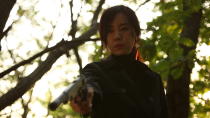Film Review: ‘Red Family’

North Korean moles disguised as a loving family in South Korea see their resolve weakened by their affection for each other and the bickering clan next door in “Red Family,” scripted, edited and exec produced by Kim Ki-duk. In general more conventional than Kim’s usual output, the pic, under the direction of freshman Lee Ju-hyoung, juxtaposes mildly overcharged scenes with oddly placed sentimentality and unexpectedly meaningful moments that carry emotional weight. At times grating but generally enjoyable in an unchallenging way, “Red Family” won the audience prize in Tokyo and will benefit from Kim’s name at fests.
In a picture-perfect house on a picture-perfect street lives a picture-perfect family — at least, that’s how it looks from the outside. In reality, they’re spies sent from Pyongyang to gather secrets and assassinate the regime’s enemies. Baek Seung-hae (Kim Yumi) is the leader, impossibly cheery and kind in public, but within the cell, she’s a hardass bitch who makes Ninotchka look like Mary Poppins. Together with her pretend clan — husband Kim Jae-hong (Jung Woo), father-in-law Son Byeong-ho (Cho Myung-sik) and daughter Oh Min-ji (Park So-young) — they suppress their emotions in the belief that a job well done will protect their real families in the North.
Next door, the Lees project a very different image. Volatile Dad (Park Byeong-eun), vulgar spendthrift Mom (Kang Eun-jin), bullied son Chang-su (Oh Jae-moo) and kindly Grandma (Kang Do-eun) are North Korea’s idea of a decadent South Korean clan, with their regular screaming matches and wasteful ways. Yet a bond forms between the two teens and the two grandparents, and even Seung-hae begins to emerge from her steel-plated shell, thanks to repeated interactions with the humanizing Lees. When word arrives that Jae-hong’s real family was caught attempting to flee the North, the spies hatch an independent plan to kill a high-level defector, hoping the bold move will appease their supervisors and save Jae-hong’s loved ones; things don’t go as planned.
The Lees are characterized by an over-the-top-cartoonishness, particular the mother, whose blowsy appearance, drunken gait and frequent screeching are far more ridiculous (and annoying) than Seung-hae’s frigidity. Where the latter’s ruthlessness is explained by her need to fulfill her undercover role, lest she jeopardize her daughter’s well-being in the North, intimations of a real figure beneath Mrs. Lee’s posturing still don’t make her sympathetic.
More successful are the two teens: Min-ji’s strength and resolve literally come to Chang-su’s rescue, while the boy’s sensitivity helps her reawaken her emotional core. In playing these dynamics against scenes in which the spies brutally murder enemies of Pyongyang, the film strives for the kind of dissonant edginess that Kim Ki-duk masters, yet can’t escape a whiff of moralism generated by its overly preachy family-values propaganda. Still, although the disturbing final scene doesn’t feel completely integrated, its heavy-handed message about how affection can overcome fear provides a needed poignancy. Humor is also on show, including an amusing shot of Seung-hae and Jae-hong at the movies watching “Poongsan,” which Kim scripted and produced.
Visuals are well handled if unexceptional, with Lee Chun-hee’s camera often seeming to hover slightly in a nod to the general sense of insecurity. Music is half-heartedly used.
Related stories
RAM Releasing Buys Kim Ki-duk's 'Moebius'
Korean Film Industry: Censorship Rising?
Tokyo Festival Highlights Asian Interest
Get more from Variety.com: Follow us on Twitter, Facebook, Newsletter
